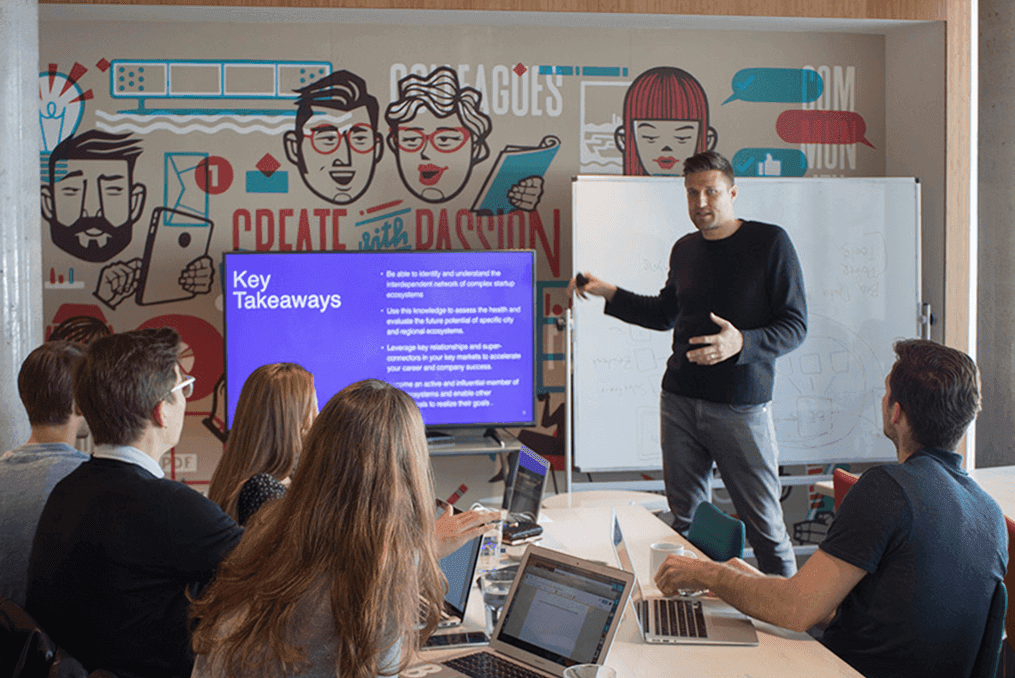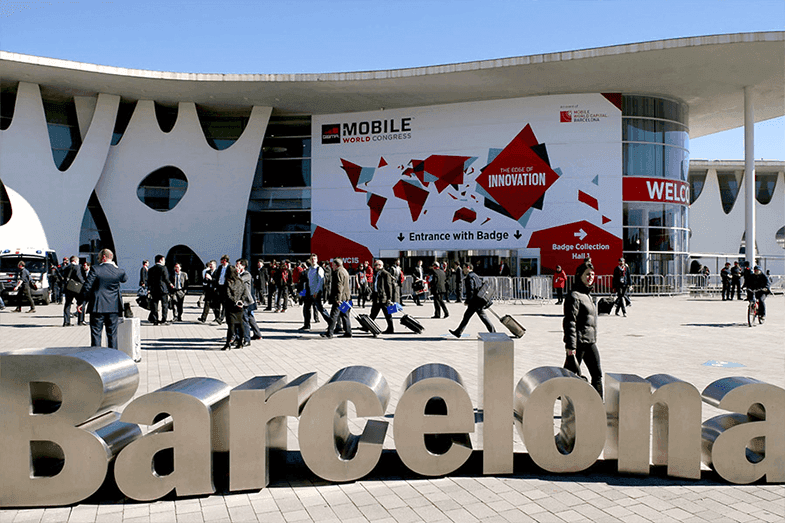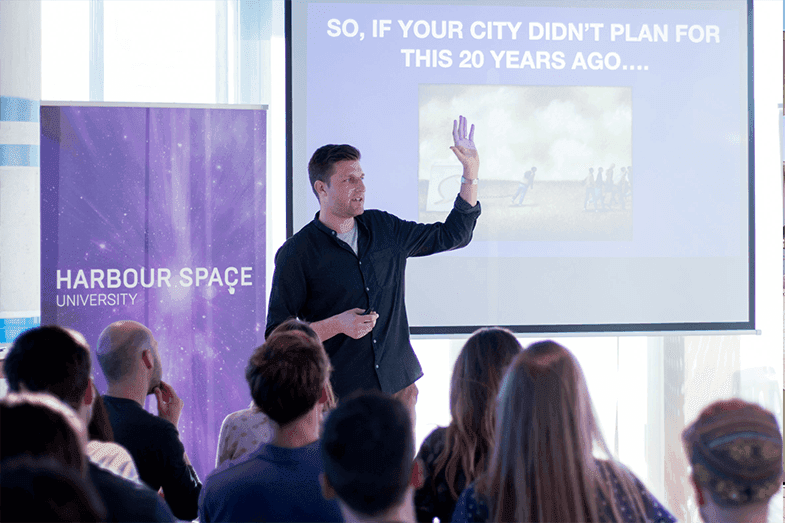Harnessing the Power of Startup Ecosystems With Scott Mackin
Curating a healthy ecosystem can be daunting. So how do we navigate, and in turn, harness the power of one? Harbour.Space lecturer, Scott Mackin, gives us his thoughts.


UX Designer
Curating a healthy ecosystem can be daunting. So how do we navigate, and in turn, harness the power of one? Harbour.Space lecturer, Scott Mackin, gives us his thoughts.
“My first exposure to the startup ecosystem is from Boulder, where I grew up. Startup ecosystems are not just a bunch of entrepreneurs and startups, it takes everyone else: lawyers, tax agencies, university students providing the talent, the government providing friendly tax and corporate law. All the different elements that play a part in the community, that is really what will foster long term sustainable growth,” says entrepreneur, Scott Mackin, Founder and CEO of Barcinno. Scott was a lecturer at Harbour.Space University for three weeks, and took the students on an interactive journey within the startup ecosystem world.
What Is a Startup Ecosystem?
A startup ecosystem is a deliberate initiative by people and organisations to create new companies in a specific location. It’s important to know that it is deliberate, it is on purpose, it’s not by accident.
They provide exposure to new ideas, new systems, new ways of doing things, new people, new money. It accelerates the speed we move it. For things to happen, we need new ideas and fresh blood. Ecosystems put us in the same box, the same group, and keep us talking.
The most important key to success is access: access to ideas, access to talent, access to customers. This makes startup ecosystems important - they have to be and feel inclusive. From the minute you touch down in Barcelona you need to feel included.
The biggest idea here is the cross-pollination of ideas, they allow ideas to mingle naturally,” Scott pronounces. “You may have half of something and someone on the other side has the other half.”

It takes a village to raise a startup Ecosystems are an exponential effect. The earlier you start and the faster you grow, the faster you can grow. But it can’t be done alone.
The idea is that startup ecosystems consist of different pillars that they lean on. Essentially, an ecosystem does not just consist of the startups themselves, but the researchers in the universities who train and supply the talent, the corporations, the investors, the service providers and the government.
“We are surrounded by pillars of organisations, inside we also have key players associated with startup ecosystems: the investors, the entrepreneur, the mentors etc.,” says Scott. The idea is that it is both a collaborate and deliberate effort to grow a startup hub.
The whole point is that it takes a village to grow a company. It’s not just the startups on their own,” Scott advises on the growth of the startup ecosystem.
Most of the successful startup ecosystems are over twenty years in the making, according to Brad Fell, Boulder-based entrepreneur-turned-venture-capitalist. Some of the biggest names such as Silicon Valley in the US and Tel Aviv in Israel are built over at least forty years.
The soil needs to be rich in nutrients, the seed needs to be planted, watered, and cared for.
Touching Base With the Barcelona Startup Ecosystem
Barcelona has become the hot new hub, a thriving startup ecosystem along the Mediterranean, at the crossroads of western Europe, eastern Europe and Africa.
Barcelona was at the front and centre in the course because many of the students want to be based here, and are currently in Barcelona.
The city of Barcelona has a lot of unique ingredients many other cities do not. It is a great magnet for attention and attracting talent. It also has the soft elements such as the high quality of life, the Mediterranean climate, and the warm and vibrant culture. Barcelona is fast becoming a global brand, and the entire world knows it. Many entities want to be tied to, such as Mobile World Congress, 4-Years-from-Now, and Startup Grind, among others.

The class leaned on Barcelona as a case study for understanding how ecosystems work. The students also had the opportunity to experience it for the bustling hub that it is. They attended the Barcelona Tech City at Pier One, the monthly Startup Grind event, the talk at OneCoWork and attended EU Startup Summit. Scott made the effort to take the students outside of the classroom for an immersive learning experience.
How to Get Involved in the Startup Ecosystem
Now that we know what a startup ecosystem is, and where they are, the next step is getting involved. “My goal was to bring value to the students and to teach them how accessible this is and how there are no barriers to entry, you just need to make it happen for yourself,” Scott advises his class, “As most things in life. Just go do it.”
Feel out the startup events happening near you. Barcelona has become base camp for some pretty exciting startup meetups. Barcinno, Scott’s own startup, is one of Barcelona’s leading sources on information about growing startups and events to attend.
Scott advises entrepreneurs and the general public to be an active member in the ecosystem of their city. Go to the events, meet the people, and give time to people who are new. Startup ecosystems, by nature, are inclusive, and should make everyone feel welcome.
Startup Ecosystems in the Smart City World
There is an overlap between startup ecosystems and smart cities, because cities are the future. Over the last 50 years, cities have been attracting all the talent into dense, urban ecosystems.
By 2030, 60% of the global population will be inhabiting cities, according to a UN Report.
The advance of technology and urgent collection of data can help to improve quality of life. Third party providers and startups can utilise that data and add value to citizens. However, a system needs to be fostered where the data is open and shared, as well as secure. As soon as you take advantage of smart city technologies to bring value back to the people, they win.
Cities can look to the startup and private sectors to help accelerate and take advantage of these tools we have now, but to do it in a responsible way. This is already manifesting in countries like India, where big data helps in the effective delivery of civic amenities and services for millions of citizens (Smart Urban Nations). And this is only the beginning.
Startups offer a fresh vista on life. That vigor can help reimagine the cities we live in and address major challenges, such as climate change, services and public delivery. Private sector involvement can be a driver for change, but there is the risk of keeping the wealth amongst the wealthy, so it is important for it to balance and distribute the value across society.
Smart Cities are coming in like an external missile heading towards startup ecosystems and it’s going to be a big explosion at the right time, at the right place,” concludes Scott.
Thanks for reading
If you’re interested in further growth, take a look at our website to learn what your future could look like at Harbour.Space. Lastly, get in touch with us at hello@harbour.space to let us know your thoughts!
